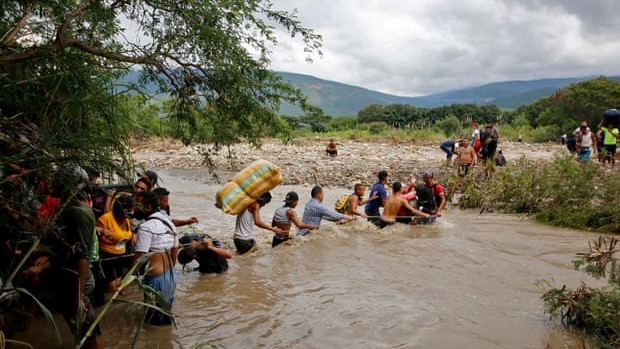
Venezuelan-Colombian border, last year, when the official crossing was closed due to Covid. Photo: Schneyder Mendoza – AFP – Getty
Country at a ‘tipping point’ that could affect wider region, experts warn, as ‘donor fatigue’ causes aid shortfall.
By The Guardian
Jun 21, 2021
The continuing exodus of millions of Venezuelans is reaching “a tipping point” as the response to the crisis remains critically underfunded.
More than 5.6 million have left the country since 2015, when it had a population of 30 million, escaping political, economic and social hardships. It has become the largest external displacement crisis in the region’s history, and the most underfunded.
“Never in our history in Latin America have we faced such movement of people out of a country that was one of the richest in the region and a country that is not at war,” said Eduardo Stein, special representative of the UNHCR, the UN refugee agency, and the International Organization for Migration (IOM). “Whatever fails in one of the largest and richest countries in the subcontinent is going to affect the rest of the region. Latin America will never be the same.”
He claimed “donor fatigue” threatened funding, saying: “This pandemic has hit very hard those developed countries who have been traditional donors.
Stein hoped that a conference hosted by Canada last week would bring renewed attention “because we do not think that Latin American countries by themselves will be capable of dealing with this”.
Governments and agencies at the videoconference in Canada pledged $1.5bn (£1.1bn) in funding to respond to the crisis, including $954m in grants and $600m in loans. At least 30 countries were reported to have committed money.
Dany Bahar, senior fellow at the Brookings Institution, in Washington DC, told the Guardian there remained “a big gap” in help for Venezuelan refugees, compared with other modern crises, such as Syria.
He said the total funding per capita for Syrian refugees was more than 10 times that for Venezuelans – at $3,150 compared with $265, based on figures for 2020. Venezuela is second only in the world to Syria in terms of external displacement.
“Most of the host countries in the Venezuelan refugee crisis are in the region, and are developing countries,” Bahar said, “whereas Europe had much skin in the game in the case of the Syrians. Maybe that triggered much more generous funding.”
Last year’s UN response plan received less than half the $1.41bn requested.
The Red Cross has said it needs to raise $264m to support Venezuelans and 17 host countries over the next three years.
Border closures due to the pandemic stalled migration. But by the end of 2020, 3.9 million Venezuelans were designated as being displaced abroad without formal refugee status – but still judged in need of international protection – up from 3.6 million in 2019, according to the latest UN figures.
Stein said 1,800 to 2,000 people had been leaving Venezuela daily in the past three months, many taking dangerous paths out, including using people traffickers.
…
Read More: The Guardian – ‘Latin America will never be the same’: Venezuela exodus reaches record levels
…

